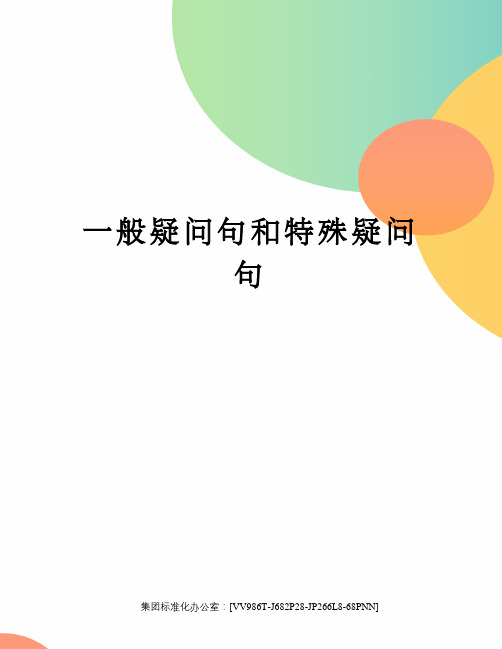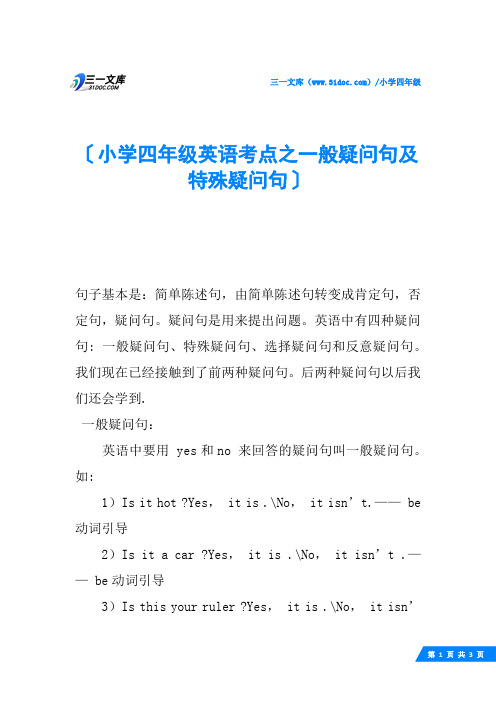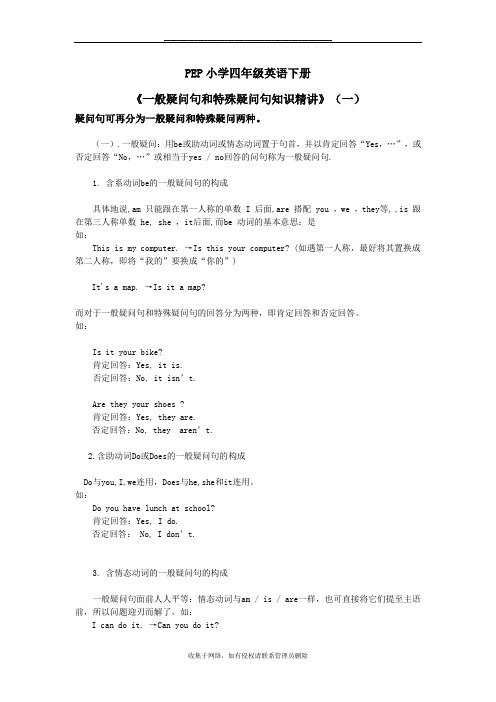最新四年级-一般疑问句和特殊疑问句
一般疑问句和特殊疑问句完整版

一般疑问句和特殊疑问句集团标准化办公室:[VV986T-J682P28-JP266L8-68PNN]一般疑问句与特殊疑问句Date:_______ name:_______一、【一般疑问句】1. 定义:用be、助动词或情态动词置于句首,并以“Yes,…”,或“No,…”或相当于yes / no回答的问句称为一般疑问句.2. 含系动词be的一般疑问句的构成:Be +主语+其它注意:am 只能跟在第一人称的单数 I 后面;are 搭配 you,不管you是单数还是复数;is 跟在第三人称单数 he, she, it后面Eg: I'm in Class 2, Grade 7.→ Are you in Class 2, Grade 7 (如遇第一人称,最好将其置换成第二人称)It's a map of China.→Is it a map of China这是一幅中国地图吗3. 含实义动词的一般疑问句的构成:Do/Does +主语 + 动词原形 + 其它注意:主语为第三人称单数,谓语动词为一般现在时单数第三人称形式"v-(e)s"时,用does,并要将谓语动词变回原形(如has→have,likes→like等);有时陈述句中的some还要变作any等。
如:Eg: She lives in Beijing. →Does she live in BeijingI like English. →Do you like EnglishThere are some books on my desk.→Are there any books on your desk4. 含情态动词的一般疑问句的构成:情态动词+主语+动词原形+其它Eg: I can spell it. →Can you spell it?I will do that for her. →Will you do that for her?She can drive. →Can she drive5. 一般疑问句的应答动词保持一致。
四年级英语常见问句类型

四年级英语常见问句类型1. 特殊疑问句特殊疑问句由“特殊疑问词+一般疑问句”构成,其中,特殊疑问词如what(什么)、where (哪里)、how(怎样)等。
回答这类问题需要根据情况进行作答。
例如:Q: What time is it?A: It's 8 o'clock.(问:几点了?答:8点了。
)Q: Where are you from?A: I'm from Beijing.(问:你来自哪里?答:我来自北京。
)2. 选择疑问句选择疑问句是一种提出两个或两个以上可能的答案供对方选择的疑问句,常用一般疑问句的形式。
例如:Q: Shall we go shopping today or watch a movie tomorrow?(问:我们今天去购物还是明天去看电影?)A: Let's go shopping today.(答:今天我们去购物吧。
)3. 反义疑问句反义疑问句是附加在陈述句之后,对陈述句所表示的事实提出询问的疑问句。
其构成一是陈述句加上简短的反义疑问句,二是陈述句加上简短的不定式。
例如:Q: The young man is a doctor, isn't he?(问:那个年轻人是一名医生,不是吗?)A: Yes, he is a doctor.(答:是的,他是一名医生。
)以上三种类型的问句是四年级英语中最常见的问句类型,学生们可以通过多加练习来掌握它们的结构和用法。
除了问句的练习,学生们还可以通过对话、角色扮演等形式来提高自己的英语口语和表达能力。
注意,英语学习需要长期的积累和不断的实践,不要急于求成,要注重基础知识的掌握和实际应用能力的培养。
同时,要善于总结和归纳,掌握学习技巧,提高学习效率。
小学英语特殊疑问句和一般疑问句的归纳

特殊疑问句和一般疑问句的答法一般疑问句通常都是1..以be (am,is,are,)开头2.以Do,Does,Did 开头或以Can开头回答方法:前面用什么提问的就用什么答。
只有两种回答方式:1)肯定的,Yes,主语+ 提问词.2)否定的No,主语+提问词+not.【注意:问句与答句的第一二人称要互换】如:④主语是名字时的答语:看性别,男的用he ,女的用she ,其他的用it 复数就用they。
如:①Is she……? Is he………? Is it……..?Yes, she is.Yes, he is. Yes, it is.No, she isn,t. No, he isn,t. No, it isn,t.②Are they………? Are the monkeys …….?Yes, they are.Yes, they are.No,they aren’t No,they aren’t③Do they………?Does he……..? Did she…….?Yes,they do. Yes,he does. Yes, she did.No,they don’t. No,he doesn’t. No,she didn’t.④Are you……..?Are you……..? Do you…….?Yes, I am.Yes, we are. Yes ,I do. 或Yes,No, I am not. No, we aren’t. No,I don’t. 或No,⑤Does Mike…….? Is ChenJi…..? Do your parents…?Yes ,he does.Yes , she is. Yes, they do.No,he doesn’t. No, she isn’t. No,they don’t.一、专项练习。
1. Did ChenJie read books yesterday?2. Can the girl cook the meals ?—————————————————————————————3.Is he going to swim this afternoon?4. Are they going to take a trip next weend? ————————————————————————————————5.Does he often go to school by bike ? 6. Do you play basketball every weekend? ———————————————————————————————————7. Did Mike do his homework yesterday? 8. Are they playing basketball now?————————————————————————————————一般疑问句及特殊疑问句的总结一般疑问句的定义:用yes或no来回答的疑问句叫一般疑问句。
小学英语特殊疑问句和一般疑问句的归纳

特殊疑问句和一般疑问句的答法一般疑问句通常都是 1..以be (am,is,are,)开头2.以Do,Does,Did 开头或以Can开头回答方法:前面用什么提问的就用什么答。
只有两种回答方式:1)肯定的, Yes,主语 + 提问词.2)否定的 No,主语+提问词+not.【注意:问句与答句的第一二人称要互换】如:④主语是名字时的答语:看性别,男的用he ,女的用she ,其他的用it 复数就用they。
如:①Is she…… Is he……… Is it……..Yes, she is. Yes, he is. Yes, it is.No, she isn,t. No, he isn,t. No, it isn,t.②Are they……… Are the monkeys …….Yes, they are. Yes, they are.No,they aren’t No,they aren’t③ Do they……… Does he…….. Did she…….Yes,they do. Yes,he does. Yes, she did.No,they don’t. No,he doesn’t. No,she didn’t.④Are you…….. Are you…….. Do you…….Yes, I am. Yes, we are. Yes ,I do. 或 Yes,No, I am not. No, we aren’t. No,I don’t. 或No,⑤Does Mike……. Is ChenJi….. Do your parents…Yes ,he does. Yes , she is. Yes, they do.No,he doesn’t. No, she isn’t. No,they don’t.111v1.0 可编辑可修改一、专项练习。
1. Did ChenJie read books yesterday2. Can the girl cook the meals—————————————————————————————he going to swim this afternoon 4. Are they going to take a trip next weekend ————————————————————————————————5.Does he often go to school by bike 6. Do you play basketball every weekend ———————————————————————————————————7. Did Mike do his homework yesterday 8. Are they playing basketball now————————————————————————————————一般疑问句及特殊疑问句的总结一般疑问句的定义:用yes或no来回答的疑问句叫一般疑问句。
小学四年级英语考点之一般疑问句及特殊疑问句

1.肯定句:2.否定句:3. 一般疑问句及肯否定回答
1) 主语+be动词+….1) 主语+be动词+not+….1)be动词+主语+…?
Yes, 主语+be动词./
No, 主语+be动词+not.
I am a teacher. I amnot a teacher.Are you a teacher?
--Yes. they are./ No, they aren’t.
2) 主语+情态动词can+… 2) 主语+情态动词can+ not+….2)情态动词can+主语+…?
Yes, 主语+情态动词can/
No,主语+情态动词can+ not
He can jump. He cannot/can’tjump.Can he jumpsn’t.—— be动词引导
2)Is it a car ?Yes, it is .\No, it isn’t .—— be动词引导
3)Is this your ruler ?Yes, it is .\No, it isn’t .—— be动词引导
--Yes,he can./ No, he can’t.
3)助动词do/does+主语+…. 动词原形+….动词原形?
Yes, 主语+助动词do/does.
No, 主语+助动词do/does+not.
He likes to eat apples. He doesn’t like to eat apples. Does he like to eat apples?
最新PEP小学四年级英语下册一般疑问句和特殊疑问句知识精讲

PEP小学四年级英语下册《一般疑问句和特殊疑问句知识精讲》(一)疑问句可再分为一般疑问和特殊疑问两种。
(一).一般疑问:用be或助动词或情态动词置于句首,并以肯定回答“Yes,…”,或否定回答“No,…”或相当于yes / no回答的问句称为一般疑问句.1. 含系动词be的一般疑问句的构成具体地说,am 只能跟在第一人称的单数 I 后面,are 搭配 you ,we ,they等, ,is 跟在第三人称单数 he, she ,it后面,而be 动词的基本意思:是如:This is my computer. →Is this your computer? (如遇第一人称,最好将其置换成第二人称,即将“我的”要换成“你的”)It's a map. →Is it a map?而对于一般疑问句和特殊疑问句的回答分为两种,即肯定回答和否定回答。
如:Is it your bike?肯定回答:Yes, it is.否定回答:No, it isn’t.Are they your shoes ?肯定回答:Yes, they are.否定回答:No, they are n’t.2.含助动词Do或Does的一般疑问句的构成Do与you,I,we连用,Does与he,she和it连用。
如:Do you have lunch at school?肯定回答:Yes, I do.否定回答:No, I don’t.3. 含情态动词的一般疑问句的构成一般疑问句面前人人平等:情态动词与am / is / are一样,也可直接将它们提至主语前,所以问题迎刃而解了。
如:I can do it. →Can you do it?肯定回答:Yes,I can.否定回答:No, I can’t.(记住在改成一般疑问句时应该将第一人称改成第二人称)Can I wear my new shirt today?肯定回答:Yes,you can.否定回答:No, you can’t.4. 小插曲:一般疑问句的语调大部分的一般疑问句都应读作升调(↗),并落在最后一个单词身上。
一般疑问句和特殊疑问句知识点总结

一般疑问句和特殊疑问句知识点总结一、一般疑问句。
1. 定义。
- 一般疑问句是用来询问某事是否属实,需要用“是(yes)”或“否(no)”来回答的疑问句。
例如:“Are you a student?”(你是一名学生吗?)2. 结构。
- be动词(am/is/are/was/were)开头的一般疑问句。
- 当句子中有be动词时,将be动词提到句首,句末加问号,句子中的主语如果是第一人称要变为第二人称。
- 肯定句:I am a teacher.(我是一名教师。
)- 一般疑问句:Are you a teacher?(你是一名教师吗?)- 其回答形式为:Yes, 主语+be动词. / No, 主语+be动词+not.- 例如:Are you from China? Yes, I am. / No, I'm not.- 助动词(do/does/did)开头的一般疑问句。
- 当句子中的谓语动词是实义动词,且句子时态为一般现在时(主语不是第三人称单数用do,主语是第三人称单数用does)或一般过去时(用did)时,将助动词提到句首,动词恢复原形,句末加问号。
- 肯定句:He likes apples.(他喜欢苹果。
)- 一般疑问句:Does he like apples?(他喜欢苹果吗?)- 肯定句:I played football yesterday.(我昨天踢足球了。
)- 一般疑问句:Did you play football yesterday?(你昨天踢足球了吗?)- 回答形式为:Yes, 主语+do/does/did. / No, 主语+don't/doesn't/didn't.- 例如:Do they go to school by bike? Yes, they do. / No, they don't.- 情态动词(can/could/may/must等)开头的一般疑问句。
小学英语语法一般疑问句和特殊疑问句ppt课件

Irene
最新版整理ppt
1
一般疑问句
Is ………………?
Are ………………? Was ………………?
be动词
Were ……………?
Do ………… ?
Did …………?
助动词
Does ………… ?
Can ………… ? 情态动词
一般疑问句的回答只能用Yes或No.
Who 谁
( 问人)
Where 在哪里
(问地点)
Which 哪一个 (问选择)
Why 为什么 (问原因)
What 什么
( 问东西、事物)
How
怎样 (问方式、手段,程度、情况
最新版整理ppt
7
Mike: W__h_e_r_eare we going to this year?
Mum: we will go to Harbin.
2、如句子里是动词就在这些词前加 don't,doesn't,didn't
(1)主语是第一、二人称(复数)加don’t,第三人称单数加
doesn't
(2)如果是过去式就加didn't
例:I like dogs.
She likes swimming.
I don‘t like dogs.
She doesn’t like swimming.
最新版整理ppt
3
3、如上述二者都没有,就应把助动提到句首。 助动词(do、did、 does)
分四个步骤:
(1)肯定陈述句中本来是没有助动词的,要加上去, 位置在主语(某人或某物)后,动词前。
(2)确定助动词用do、does还是did,根据句中动 词,动词是原形的助动词就用do,动词是第三人称单 数的助动词就用does,动词用过去式的助动词就有 did。 (3)把助动词后提到句首。 (4)原句中动词假如发生变化就要恢复成原形。 强调一点,有some的要考虑是否要用any。
- 1、下载文档前请自行甄别文档内容的完整性,平台不提供额外的编辑、内容补充、找答案等附加服务。
- 2、"仅部分预览"的文档,不可在线预览部分如存在完整性等问题,可反馈申请退款(可完整预览的文档不适用该条件!)。
- 3、如文档侵犯您的权益,请联系客服反馈,我们会尽快为您处理(人工客服工作时间:9:00-18:30)。
一般疑问句和特殊疑问句【一般疑问句】一、什么是一般疑问句?答:能用yes / no(或相当于yes / no)回答的问句叫一般疑问句。
如何将陈述句变为一般疑问句1、第一家族:含be动词或情态动词的句子秘诀:一调二改三问号一调:即把句中的be或情态动词调到主语前;二改:改换主语称谓,即将句中的主语I\my \mines\we\our\ours等第一人称分别改为相应的第二人称you\your\ yours等;三问号:句末的句号改为问号。
如:. I am an English teacher. → Are you an English teacher?. We can speak English fluently. → Can you speak English fluently?2、第二家族:含行为动词(或称为实义动词)的句子秘诀:一加二改三问号一加:即在句首加助动词Do或Does;二改:1、把谓语动词改为原形;2、改换主语称谓(同第一家组);三问号:句末的句号改为问号。
. We read English every morning. → Do you read English every morning?. Tom’s father listens to English on the radio every evening. →Does Tom’s father listen to English on the radio every evening?特别注意:对于第二家族一定要注意动词的还原,因为时态与数的变化已经体现在助动词上了。
3、加强记忆口诀:“肯变一,并不难,can 或be提在前;谓语若为行为动,do 或does句首用。
”六、“some”还是“any”?在一般疑问句中,要表达“一些”时,一般用any,但如果这个问句是用来表达“建议、请求、邀请”等交际功能时,应该some.Is there any tea in the cup?. Do you have any children?. May I have some fish?Would you like some tea?Shall we buy some vegetables?Can I borrow some money from you?Why not have some bread?How about some orange juice?练练吧一、改为一般疑问句1. I can skate well. __________ __________skate well?2. Kate does morning exercises every day.________ Kate________ morning exercises every day?3. The exam begins at nine. __________ the exam__________ at nine?4. Ann returned the book to the library yesterday._______ Ann_______ the book to the library yesterday?5. There's something to eat in the cupboard.__________ there__________ to eat in the cupboard?6. Mary likes scuba diving very much._________ Mary_________ scuba diving very much?二、用 is, are, am ,do, did ,does ,can 填空,然后变成一般疑问句1. His father ____an English teacher.2. These children_____ crying.3. They______swim.4. ______ you like reading English? Yes, I like reading English.5. How _____you go to school? I go to school on foot.6. What _____he like? He likes English.7. _____ his father go to work by bus? No, his father rides a bike to work.8. ______ your father read newspaper last night? No, he read a story book.9.I ____ a teacher.一般疑问句10. He ____ a doctor.一般疑问句11.You _____ good workers.一般疑问句12.______ (它是) an apple.一般疑问句13.They _____ workers.一般疑问句14.I _____ three books.一般疑问句He ____ many trees.一般疑问句I can speak English.一般疑问句They can swim.一般疑问句Shall he call you tonight?陈述句I need finish my work.一般疑问句【特殊疑问句】特殊疑问句要由疑问代词或疑问副词开头,询问的内容不同, 使用的疑问词也不同。
我们学过的疑问词有特殊疑问词有:what(什么) what colour(什么颜色) what time(几点) what day(星期几)how(怎样) how old(多大、几岁) how many(多少) who(谁) how much (多少钱)when(什么时候) whose (谁的) where(在哪里) why(为什么) which(哪一个)what(询问事物), how much(询问价格), what time (询问时间,尤其是点钟), what kind of(询问种类), why(询问原因),who(询问人), where(询问地点)等等。
如:特殊疑问句:以特殊疑问词开头,对句中某一成分提问的句子。
常用的疑问词有:what who whose which when where how why等。
可先分为3种:疑问代词:what,who,which,whose,whom疑问副词:when,where,why,how疑问形容词:what(which,whose)+名词特殊疑问句有两种语序1.如疑问词作主语或主语的定语,即对主语或主语的定语提问,其语序是陈述句的语序:疑问词(+主语)+谓语动词+其他成分。
如:Who is singing in the room? whose bike is broken?2.如疑问词作其他成分,即对其他成分提问,其语序是:疑问词+一般疑问句语序?如:What class are you in?What does she look like?Where are you from?What time does he get up every morning?注意:回答特殊疑问句时,不能用yes / no,即问什么答什么,尤其是简略回答。
如:Who is from Canada? Helen (is).Where's the restaurant? Near the station.Why do you like koalas? Because they are cute.特殊疑问句练习题一、选择正确的单词填空 (who, where, when)1._____ is that pretty girl? She is my sister.2._____ are Jack and Tom? They are behind you.3._____ do you go to school? I go to school from Monday to Friday.4._____ has a beautiful flower? John has a beautiful flower.5._____ are they? They are my parents.6._____ is my mother? She is in the living room.7._____ are you going? We are going to the bakery(面包坊).8._____ do Jim and Wendy play ball? They play ball in the afternoon.9._____ does he jog? He jogs in the park.10._____ are you from? I'm from Changchun city.二、就画线部分提问1.He is my father._______________________________________________2.They are under the tree._______________________________________________3.I often watch TV after dinner.(晚饭后)_______________________________________________4.Lily swims in the swimming pool.(游泳池)_______________________________________________5.Superman flies in the sky.________________________________________________6.I often brush my teeth in the evening.________________________________________________7.Alan likes to play with Bill.________________________________________________8.Joe's father plays badminton(羽毛球) every weekend.________________________________________________9.The supermarket is near the school._________________________________________________10.The laptop(笔记本电脑) is on the table._________________________________________________三.用what time, what color, what day, what填空。
